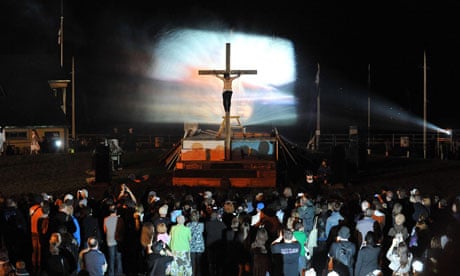Michael Sheen's The Passion: 72 hours in theatre heaven This epic production drew together the people of Port Talbot and explored myriad ways of delivering theatre – from Twitter to whispered rumour. Has it changed the shape of participatory performance?
Michael Sheen's The Passion: 72 hours in theatre heaven
This epic production drew together the people of Port Talbot and explored myriad ways of delivering theatre – from Twitter to whispered rumour. Has it changed the shape of participatory performance?
When The Passion finally drew to a close on Aberavon seafront in Port Talbot on Sunday evening, there was a sense not just that the town of Port Talbot had been transformed by the experience, but also the future of large-scale participatory theatre. Aside from its mix of tenderness and mucky grandeur, its majestic sweep and careful attention to small, everyday details, one of the most thrilling things about National Theatre Wales's and Wildworks' production was the way that it operated in so many spaces simultaneously. It raised not just the ghosts and future hopes of the town, but the spectre of how and where theatre happens – and how it might connect with a hyper-connected 21st-century audience, particularly those who seldom go anywhere near a theatre building.
For many people, The Passion was an epic piece of theatre experienced in real time and real space over a 72-hour period in different locations across Port Talbot. Undoubtedly that was the core of the experience, and so it should be: without that core everything else would count for nothing. But just as The Passion could be accessed both by payment or completely for free, there were many entry points, too: online, through posters and leaflets, via YouTube, through tweets and live streaming, as a novelisation, even through rumour, conjecture and whispers. What was interesting was the way that all these platforms came together. Although you could follow The Passion using just one way in, using several of them at once resulted in a richly layered and rewarding experience. From the moment pictures began appearing online of something taking place on the beach at 5.30am on Friday morning, long before the official start of the piece at 3pm, the show generated a real buzz in the town with many chasing not just the scheduled performances but the more elusive moments too. Those canny enough to follow Michael Sheen's Jesus-like Teacher off the beach at Aberavon were rewarded by seeing him gather the fisherman Peter to his side. Later on, lights glimpsed up on the hill on Good Friday evening gave rise to stories that spread like wildfire through the town.
"I remember," was the Teacher's cry at the Crucifixion. In most theatre, there is the event and then there is the memory of the event – but seldom has a theatre piece been as well-documented as The Passion both by professionals and audience. This was a show that was watched not just through the human eye but through the lens of the cameraphone; another thing I found really intriguing was that people often made no distinction between the bits they saw live-streamed and the bits they saw played out in front of them. Many of those who weren't inside the Seaside Social and Labour Club as Sheen's character broke his sandwich in half and shared it with his followers, or when the Manic Street Preachers were arrested on stage, thought that they had been. I suspect that the fact that they felt that they owned The Passion had a great deal to do with their receptiveness, perhaps also the fact that Wales has a strong participatory arts tradition.
National Theatre Wales has always framed itself as a community, and this was community in action. Over the year of its inaugural season NTW has worked using many different platforms to present many different kinds of theatre in many different formats and places. It felt as if The Passion – the final show in the first season – not only pulled together the people of Port Talbot, but also all the different strands and ways of delivering theatre that NTW has been investigating from the start. As such it's not the end of something, but very much the beginning.

Comments
Post a Comment